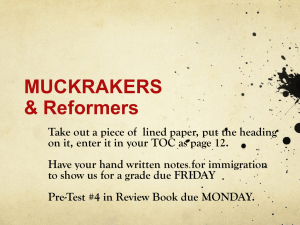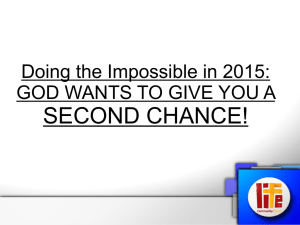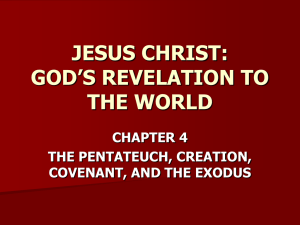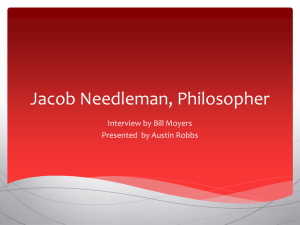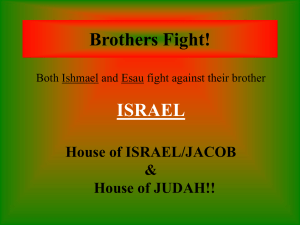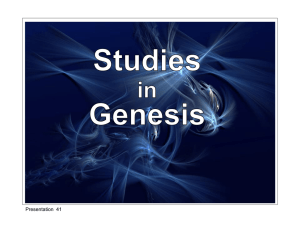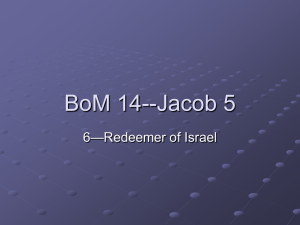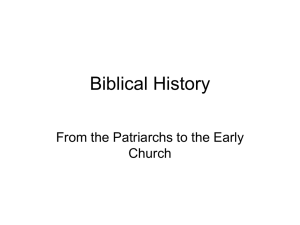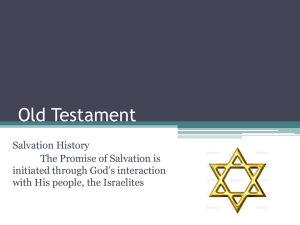49 Genesis 32v22-32 Wrestling With God
advertisement
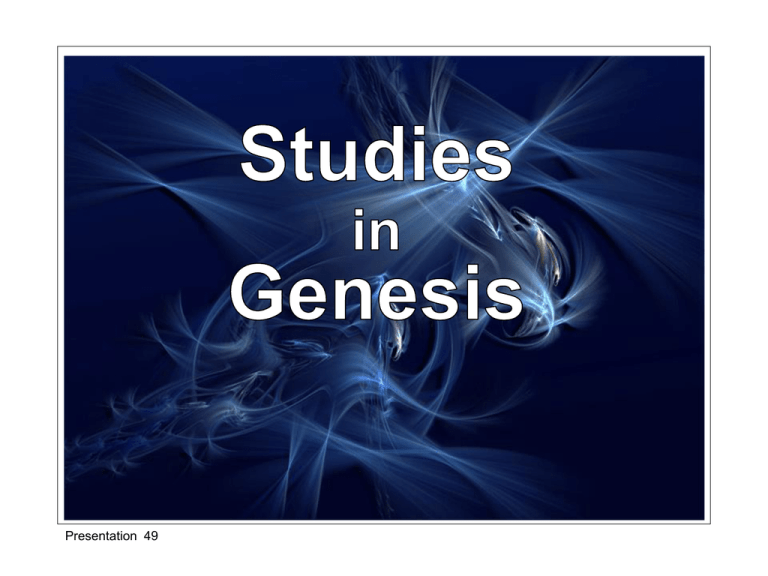
Presentation 49 Presentation 49 Introduction The Japanese language, which is written by combining a variety of characters has an interesting way of describing a ‘crisis’. It combines the character for ‘danger’ with that of ‘opportunity’ thus giving tacit recognition to the fact that crisis times can be growth times in the development of the individual. The most important crisis in Jacob's life is found in the passage before us. His crisis can be described by using four verb pictures. They are; ‘trembling, wrestling, clinging and limping.’ We will examine Jacob’s crisis by using these verbs. Presentation 49 Trembling Have you ever been kept awake at night trembling with fear? Jacob knew that experience as he prepared to meet his brother Esau. The prospect of Esau and 400 armed men riding into his camp was very unsettling! He had taken every possible precaution but would his plan for protection work? We read in v22 that he got up in the middle of the night and sent his family and possessions across the Jabbok river, while he remained alone on sentry duty. He anticipated the possibility of a night attack. Gripped by fear he was covering every contingency. Presentation 49 Trembling Jacob had left himself completely and absolutely alone. Probably the last time he had been aware of such aloneness had been 20 years previously at Bethel . Then his aloneness had provided the setting for God’s revelation. Sometimes God leads us into situations where there are no other living persons to help us for then we are often more sensitive to his communication. Jacob was about to learn that the one thing that separated him from God's greatest blessing was Jacob himself. His greatest danger was not Laban or Esau but his own stubborn self-will and oozing self-confidence. Presentation 49 Trembling Jacob was poised to enter the great turning point of his life, when he would be faced with a true knowledge of himself and of his need. Other biblical characters had made similar discoveries, when they too were alone; 1. Moses was a lonely shepherd for 40 years before being called to deliver Israel from Egypt. 2. Backslidden David, faced with the rebellion of his men, entered the classroom of loneliness at Ziglag. 3. Elijah, when alone in a cave in Mt. Horeb, had his inadequate understanding of God corrected. 4. Paul, when alone in the Arabian desert for 13 years, had his theological understanding turned upside down. Presentation 49 Wrestling While Jacob was standing guard a hand reached out and laid hold of him. He found himself wrestling for his life. Was it Esau, or one of his men? Jacob was no coward and he had no reason to think that he would not win this match. After all he had succeeded in everything he had ever attempted in life. In v30 Jacob had become aware that his protagonist was God. Hosea identifies the figure as 'The Angel of the Lord' Hos.12.4. Scholars believe this was a preincarnational appearances of Christ. God who took the initiative. This passage is mistakenly used to illustrate man's perseverance with God in prayer. But Jacob didn’t set out to pray. He was not looking for God to do business with him. The reverse was the case. God persevered with Jacob until he realised he could not win. At that juncture God would break him in order to remake him. Presentation 49 Wrestling The physical struggle of this contest mirrored a spiritual struggle of far greater importance. Jacob came not only to a point of physical but of spiritual submission. He came to realise what a poor, helpless, worthless creature he really was. Only as he recognised his weakness would he discover the source of true strength. Paul’s shares a similar experience. On three occasions he had asked God to remove his thorn in the flesh… “But God said to me, "My grace is sufficient for you, for my power is made perfect in weakness." Therefore I will boast all the more gladly about my weaknesses, so that Christ's power may rest on me. That is why, for Christ's sake, I delight in weaknesses, in insults, in hardships, in persecutions, in difficulties. For when I am weak, then I am strong”. 2 Cor.12.9-10 Presentation 49 Wrestling Have you ever had to wrestle with God, when you thought you knew better than him? If so, perhaps you can identify with what follows: First, note the duration of this wrestling match v24. It lasted from dusk till daybreak. Most professional wrestling bouts today last about 20 minutes after which the contestants are often completely exhausted! Jacob was determined he would not be beaten. The essence of stubborn self-will is a refusal to yield. And so God must sometimes become our fierce antagonist in order to overpower the strong hold of self in our lives. Presentation 49 Wrestling Secondly, Jacob's hip was put out of joint as he wrestled. This was the extreme measure God resorted to because Jacob refused to yield. God always wins this kind of contest and it is best to submit sooner rather than later. Has God ever had to put your life out of joint? Has he ever had to dislocate your plans, when you attempted something contrary to his will? Suddenly the hand of God reaches out to create a crippling financial setback, or a debilitating illness or grievous disappointment. God has many moves designed to weaken us in order that we might own him as the source of our strength. Presentation 49 Presentation 49 Clinging We have a different picture in v26. Jacob is now clinging to the one, who has defeated him. We hardly recognise the man. Jacob's strength is broken and he is clinging onto Christ for his blessing. He is no longer struggling for supremacy but clinging childlike for support. Jacob’s opponent had wasted what is recognised to be the strongest ligament in the body. Jacob would be a cripple for the rest of his life. And any hopes be may have had of overcoming or even out-running Esau are now completely dashed. He is helpless and knows it! He is totally dependent upon God to deliver him. Presentation 49 Clinging Clinging Jacob is now a man remade by God's grace and surrendered to his will. It is a faith picture made all the more remarkable by Jacob’s realisation that his protagonist was not after all Esau but God. And his longing for God’s blessing was greater than the humiliation of his ego. Jacob’s experience is beautifully reflected in Wesley’s hymn; Other refuge have I none, Hangs my helpless soul on Thee; Leave, ah! leave me not alone, Still support and comfort me. All my trust on Thee is stayed, All my help from Thee I bring; Cover my defenceless head With the shadow of Thy wing. Jacob could now say with Paul: “I will boast all the more gladly about my weaknesses, so that Christ's power may rest on me”. 2Cor.12.9 Presentation 49 Clinging The blessing Jacob sought was not cheaply secured. The Lord asks him in v27 'What is your name?' This echoed his father’s question, asked 20 years previously, when he entered Isaac’s tent disguised as his brother Esau. ‘Who are you, identify yourself before I give you my blessing’. On that occasion Jacob had replied ‘Esau’. He had pretended to be something that he wasn't in order to gain the blessing. At that point his behaviour had truly reflected the true meaning of the name ‘Jacob’, ‘heal grasper, cheat, supplanter’. Presentation 49 Clinging Now God asks the same question put to him by Isaac. ‘Who is it that seeks my blessing?’ God cannot be deceived. He sees right into our hearts. Blessing comes not by hiding our true identity but by exposing it. So by identifying himself, Jacob did more than confess his name to God, he confessed his character. He owns up to being a schemer, a plotter and a deceiver. By forcing him to confess his past God prepared him for a new beginning, marked by a new name - ‘Israel’. The change of name spoke of a change of heart. The word ‘Israel’ appears to be a compound of two Hebrew words 'sarar' meaning ‘struggle for supremacy’ and 'el' meaning ‘God’. And so ‘He struggles with God’ but the name Israel can also mean ‘God rules’. As a result of wrestling with God Jacob has now begun to submit to God’s rule. We then read ‘Israel’ in v28 as irony. Presentation 49 Clinging When Jacob had contended with men, he always thought he had won but he had really lost. He had cheated Esau of his blessing but lost his way spiritually. He had outwitted his blind ailing father but lost his home comforts. He had deceived Laban but lost his goodwill. None of these victories had brought Jacob real satisfaction. In his latest encounter, this time with God, he had suffered a reversal of fortunes. He had lost, but in losing he had won! This is divine logic. We win by losing! The greatest example of this truth is surely the death of Christ on the cross and his resurrection from the dead! Presentation 49 Clinging In the C19th, George Muller began a number children's homes for orphans in Bristol. He made no public appeal for money but looked only to God to provide. It is estimated that a sum of £2 million was donated during his lifetime. He was once asked the secret of his extraordinary fruitful life. He replied, ‘There was a day George Muller died’. He was speaking of the importance of dying to self-will. We win by losing! What did Jesus say? 'Unless a grain of wheat falls into the ground and dies, it remains only a single seed. But if it dies it produces many seeds. The man who loves his live will lose it, while the man who hates his life in this world will keep it for eternal life' Jn.12.24-25 Presentation 49 Clinging Are there wounds, which we proudly wear, deaths that we have died, surrenders we have made? Amy Carmichael challenged her Christian readership with this poem: "Hast thou no scar? No hidden scar on foot or side or hand, I hear thee sung as mighty in the land, I hear them hail thy bright ascending star, Hast thou no scar? Hast thou no wound? Yet I was wounded by the archers spent. Leaned me against a tree to die and rent, by ravening beasts that compassed me; I swooned. Hast thou no wound? No wound? No scar? Yet as the master shall the servant be, and pierced are the feet that followed me. But thine are whole: Can he have followed far, Who has no wound nor scar? Presentation 49 Limping The final picture shows Jacob limping on his way to meet Esau cf v33. Jacob left the wrestling ring as the sun was rising on a new day, on a new beginning for a new man. In the world's eyes he was a cripple. In God's sight he had become an overcomer through defeat. Jacob no longer strides confidently through life but is wholly dependent upon God. His wound, he would carry for the rest of his life - a reminder of the most critical day of his spiritual pilgrimage and a day that filled his heart with praise. A wonderful comment on the significance of this event is found in Heb. 11.21: 'By faith Jacob, when he was dying, blessed each of Joseph's sons, and worshipped as he leaned on the top of his staff.' Jacob would gladly carry his scar into the glory of eternity. Presentation 49 Limping In John Bunyan’s Pilgrim's Progress, as Mr. Valiant for the Truth was preparing to leave this earth and enter the Celestial city, he spoke these last words: “I am going to my Father's and though with great difficulty I have got here, yet I do not regret all the trouble I have been through to get to where I am. My sword I give to him who shall succeed me in my pilgrimage, and my courage and skill to him to him who can get it. My marks and scars I carry with me, to be a witness for me, that I have fought His battles, who now will be my Rewarder. Presentation 49 Conclusion Is God wrestling with you at this moment? Have you resisted his will for weeks, months perhaps years? Has God begun to touch some area of your life as he touched Jacob’s life, to bring you to an end of yourself? Are there deaths to self to which you have to die? God does not wrestle with you in order to destroy you but to equip you and make you fruitful in his service. The scars of such encounters are not to be worn with shame but with gratitude and carried into glory, where we will have the opportunity to rehearse, what God has done in and through us despite the difficulties, which we placed in his way. Presentation 49
